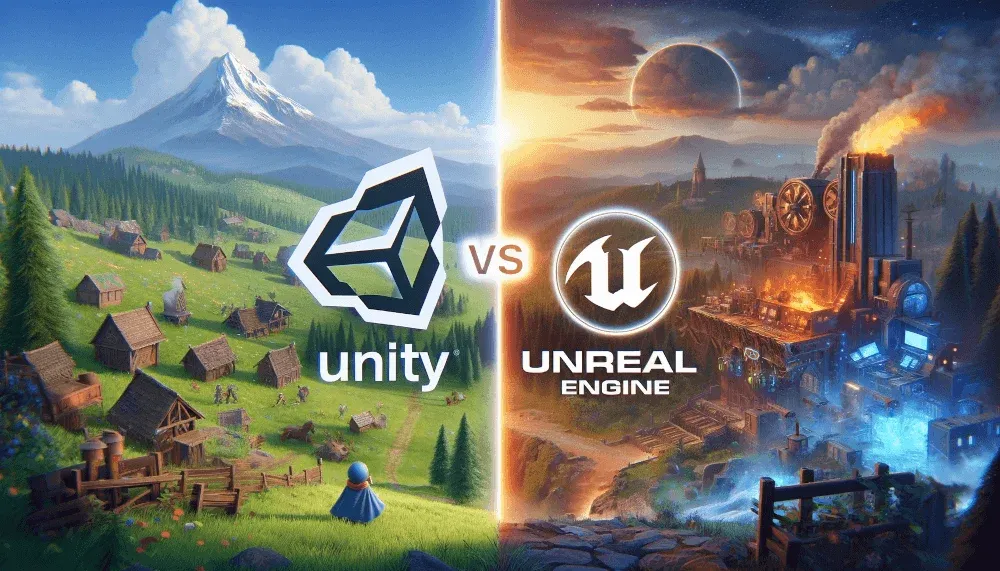Unity vs Unreal Engine: Key Differences for Game Devs

In the world of game development, Unity and Unreal Engine stand as two of the titans. Each engine boasts unique strengths and caters to different developer needs. This article aims to compare the latest features and capabilities of Unity 2023.1 and Unreal Engine 5, helping developers make informed decisions based on their project requirements.
Unity: Latest Features and Advantages
Adaptive Performance
Unity 2023.1 introduced enhanced lifecycle controls and a general Android provider, optimizing performance for a broader range of devices.
Artist and Cinematic Tools
The new Shader Graph feature in Unity streamlines shader processing, significantly reducing the time required for shader compilation.
Asset Store
Unity's Asset Store now includes the Verified Solutions program, offering a curated library of third-party assets and solutions.
Asset Bundles and Pipeline
Unity has improved its asset bundles targeting Windows, OSX, and Linux, integrating server optimizations and enhanced data management.
Authoring Tools for 2D and 3D
Enhancements in 2D tools include APIs for Sprites, custom geometry generation, and support for Sprite/SpriteShape/TilemapRenderer.
Pros of Unity
Unity is known for its user-friendly interface, making it ideal for indie developers and smaller studios. It also boasts a strong community and a vast array of assets, enhancing its flexibility for various platforms and project types.
Unreal Engine: Latest Features and Advantages
Rendering Enhancements
Unreal Engine 5's Nanite and Lumen technologies offer cutting-edge rendering, bringing unparalleled realism and detail to game environments.
Animation and Simulation
The introduction of the Experimental Skeletal Editor and advances in cloth simulation in Unreal Engine 5 have enhanced the realism and dynamics of character animations.
Virtual Production
New features like nDisplay support and the Cine Cam Rig Rail have made Unreal Engine 5 a powerhouse for virtual production, extending its capabilities beyond traditional game development.
Pros of Unreal Engine
Unreal Engine is celebrated for its advanced graphics and robust toolset, making it a go-to for AAA game development. Its support for VR and AR development is also top-notch, catering to the latest trends in gaming.
Comparing Unity and Unreal Engine
Ease of Use
Unity's interface is generally more user-friendly, especially for beginners, while Unreal Engine offers advanced tools that may require a steeper learning curve.
Graphics and Rendering
Unreal Engine is often the preferred choice for projects demanding high-end graphics, thanks to its sophisticated rendering capabilities. Unity, while versatile, is more suited to less graphically intensive games.
Community and Support
Both engines have strong communities and extensive documentation. Unity might have a slight edge for beginners due to its simpler learning curve and extensive asset store.
Flexibility and Platform Support
Unity shines in its flexibility, supporting a wide range of platforms including mobile, which is ideal for indie developers. Unreal Engine, while also versatile, is often chosen for high-end PC and console games.
Cost and Licensing
Unity offers a free version with revenue caps, whereas Unreal Engine operates on a royalty model, making it more accessible upfront but potentially more expensive in the long run for successful games.
Conclusions
Both Unity and Unreal Engine have their unique strengths. Unity is ideal for indie developers and smaller projects due to its ease of use and strong community support. In contrast, Unreal Engine is the preferred choice for AAA titles and projects where cutting-edge graphics and high-end production values are paramount. Ultimately, the choice depends on the specific needs, skills, and goals of the developer and their project. Both engines offer the tools and capabilities to bring diverse and ambitious gaming visions to life.
